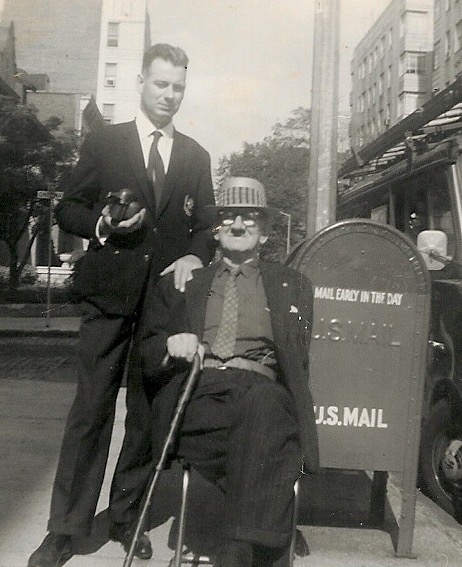Erin's Lament (arr Ian Pillow)
“A noble pursuit that showcases the range of the mighty double bass well” BBC Music April 2019
"My God, if I could only forget!" Words spoken by my Great Uncle Eugene Daly to the doctor treating him following his rescue from the sinking of the Titanic. He had ended up in the water balanced on an upturned life raft, and those words referred to the horrors he had just experienced, children crying, women screaming, all the hands and faces that he had touched while swimming in the icy water. How different it had been three days previously as he had delighted fellow travellers by playing a selection of Irish airs on his bagpipes on the deck of the Titanic as it departed Cobh, its last port of call. One of these airs was the soulful and beautiful ‘Erin’s Lament’.
“Daly’s ‘Titanic’ Double Bass Impresses” THE ART MUSIC LOUNGE—© 2018 Lynn René Bayley
Fast forward 100 years and with the help of colleagues Ian Pillow and Andy Baker, I tracked down this tune and performed it with BSO colleagues as part of two commemorative concerts in Southampton and Cherbourg, two ports the Titanic visited before departing for Queenstown (Cobh) in Ireland. Tragically for many passengers this beautiful tune may well have been one of the last they would ever hear.
The account of the sinking of the Titanic on 15th April 1912 has been retold so many times, it has almost become the stuff of legend, such that we tend to forget what a truly tragic disaster it was, with over 1500 losing their lives in horrible circumstances and for those ‘fortunate’ enough to survive what an utterly nightmarish experience they suffered. My Great Uncle Eugene narrowly escaped ending up in the former category and lived to tell such a graphic tale that when the first ‘Titanic’ film was being made “A Night To Remember” in 1958, the script-writers went to Galway to interview him and get every detail he could recall after even 46 years. Eugene it was who recounted the tragedy of the officer shooting two men dead – before another shot rings out and the officer himself falls.
When he was picked up
by the Carpathia, Eugene had been waist deep in the water for 17 hours. He was treated by aDr Frank Blackmarr, a passenger on board the Carpathia, who noted that Eugene Daly was unconscious when carried to his cabin, where he was revived with stimulants and hot drinks. Dr Blackmarr later took down Daly’s dictation of his experiences as they approached New York on 18 April 1912. This is his first account of what transpired:
"I left Queenstown with two girls from my own home town who were placed in my charge to go to America. After the accident, we were all held down in steerage, which seemed to be a lifetime. All this time we knew that the water was coming up, and up rapidly.
"Finally some of the women and children were let up, but, as you know, we had quite a number of hot-headed Italians and other peoples who got crazy and made for the stairs. These men tried to rush the stairway, pushing and crowding and pulling the women down, some of them with weapons in their hands.
"I saw two dagos shot and some that took punishment from the officers. After a bit, I got up on one of the decks and threw a big door over the side. I caught hold of some ropes that had been usedsetting free a lifeboat. Up this I climbed to the next deck because the stairs were so crowded that I could not get through.
"I finally got up to the top deck and made for the front. The water was just covering the upper deck at the bridge and it was easy to slide because she had such a tip.
([Blackmarr’s note:] Here this man fell back on his pillow crying and sobbingand moaning, saying: ‘My God, if I could only forget!’ After a bit he proceeded.)
My God, if I could only forget those women’s cries. I reached a collapsible boat that was fastened to the deck by two rings. It could not be moved. During that brief time that I worked on cutting one of those ropes, the collapsible was crowded with people hanging upon the edges. The Titanic gave a lurch downwards and we were in the water up to our hips.
She rose again slightly, and I succeeded in cutting the second rope which held her stern. Another lurch threw this boat and myself off and away from the ship into the water. I fell upon one of the oars and fell into a mass of people. Everything I touched seemed to be women’s hair. Children crying, women screaming, and their hair in their face. My God, if I could only forget those hands and faces that I touched!
As I looked over my shoulder, as I was still hanging [on] to this oar, I could see the enormous funnels of the Titanic being submerged in the water. These poor people that covered the water were sucked down in those funnels, each of which was twenty-five feet in diameter, like flies.
I managed to get away and succeeded in reaching the same boat I had tried to set free from the deck of the Titanic. I climbed upon this, and with the other men balanced ourselves in water to our hips until we were rescued. People came up beside us and begged to get on this upturned boat. As a matter of saving ourselves, we were obliged to push them off. One man was alongside and asked if he could get upon it. We told him that if he did, we would all go down. His reply was ‘God bless you. Goodbye.’
I have been in the hospital for three days, but I don’t seem to be able to forget those men, women and children who gradually slid from our raft into the water.
Signed, Eugene Daly. Collapsible B.
James & and Eugene Daly. New York 1964
My father James Daly, also a musician, toured the USA with the Irish Police Band in 1964 and met up with his Uncle Eugene, who by then had crossed the Atlantic again by ship, though in sheer terror the whole way. He did not return to America until he could do so by air!
Royal Albert Hall, London 2015.
In a particularly nice twist to the culmination of this “Erin’s Lament” recording project, Eugene’s granddaughter ‘Pricilla’ tracked me down through social media and while in London, and with her husband Charles (both music lovers!) came to the Bournemouth Symphony Orchestra's BBC Prom concert in the Royal Albert Hall,treating me to a superb supper along the way!
The following is an article from the Westmeath Independent, of 27 March 1998, featuring interviews with my Uncle, Mr Paddy Daly (nephew of Eugene) and Mrs Maura Fox (nee Concannon) the niece and god-daughter of Bertha Mulvihill (with whom Eugene was travelling on the Titanic).
Eugene remembered by his daughter:
https://www.encyclopedia-titanica.org/eugene-daly-his-daughter.html
Encyclopedia Titanica
https://www.encyclopedia-titanica.org/titanic-survivor/eugene-patrick-daly.html




